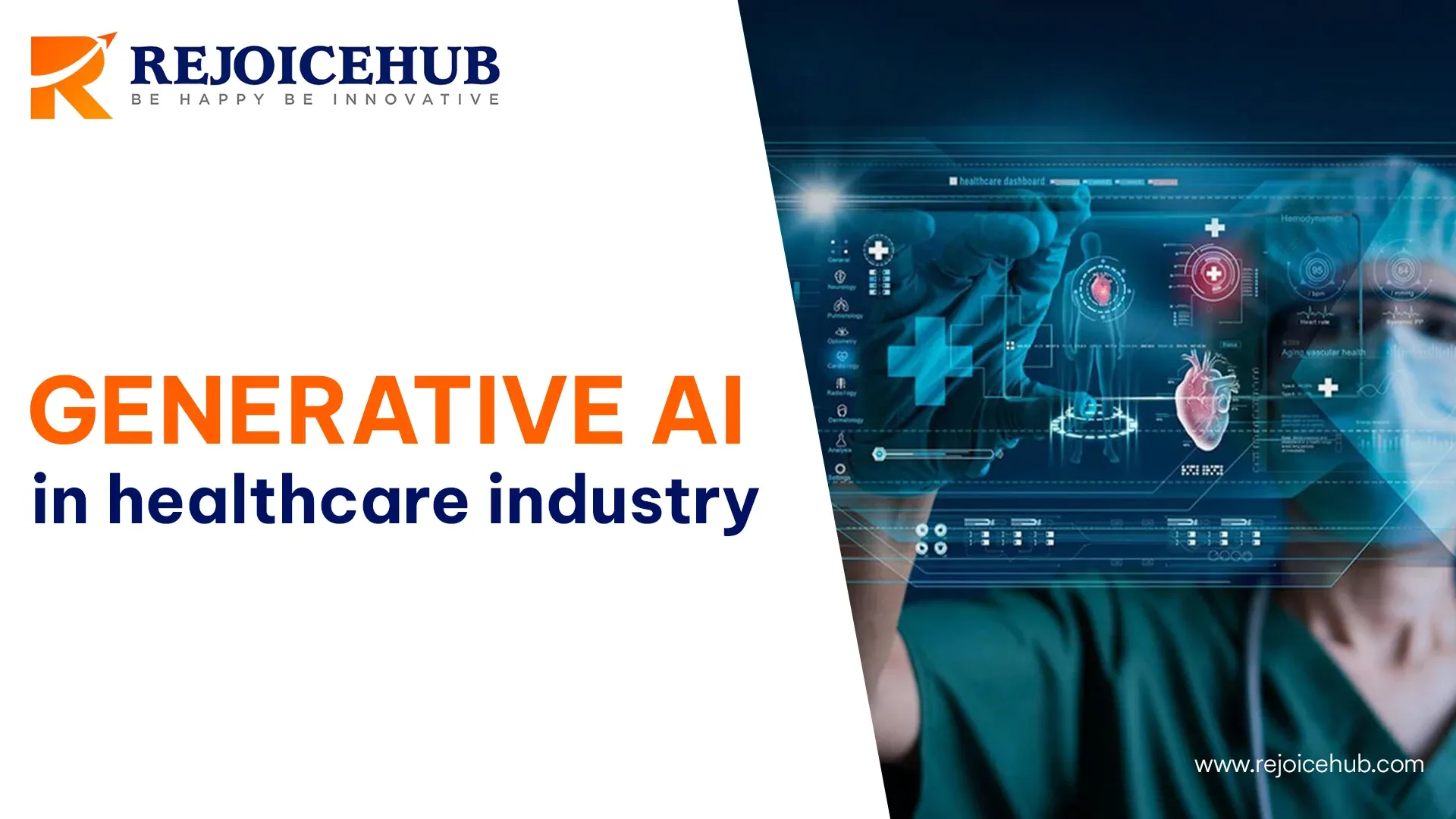
With the advent of generative AI, many laborious tasks have been simplified while a significant scope for advancements has opened up. Healthcare is no different. Generative AI is already transforming data handling, diagnostics, and personalization by enabling functionalities like real-time data processing and analysis. It has significant potential to revolutionizing research, treatment, and overall health management.
However, many challenges have emerged in the wake of these developments. Critics are raising concerns about data privacy, AI biases, and human elements in medicine, which need to be resolved while handling challenges such as accuracy. To develop a deeper analysis of the applications and challenges of generative AI, let's first understand the concept of AI for healthcare.
What is generative AI in healthcare?
The use of generative AI is transforming healthcare with uses in data analysis, documentation, and diagnosis, to begin with. Using generative AI, we can predict outcomes and personalise treatments based on the data healthcare facilities generate.
It also has many applications in healthcare research, accelerating the discovery of new drug compounds and reducing both cost and time. One use case in research is the advancement in personalised treatment based on individual data.
However, there have been many challenges to its implementation. A diverse set of data is needed to reduce the chances of biased outcomes in research studies and their application. Further integrating it into our system has been exceedingly challenging.
There have been many concerns about data privacy in AI, which makes it essential for organizations to establish regulations and policies for ensuring the security of sensitive patient data. As a result, there has been a lot of focus on ethical standards and oversight in the application of generative AI in healthcare.
The other ongoing debate has been whether robots will be replacing healthcare workers, though the consensus maintained by most pioneers in the field is that generative AI will have an assistive role in healthcare, taking care of repeated tasks and certain specialised tasks, always requiring oversight by a professional. In the foreseeable future, it will not replace medical professionals. Let's take a deeper look into its other potential uses and the challenges in the adoption of AI in the healthcare industry.
Aslo read this article : What is generative AI? How does it work?
Potential use cases of generative AI in healthcare
Generative AI is having a mini-revolution, and healthcare and medicine are undergoing a transformation with a massive impact, leading to better efficiency and quality of treatment. Generative AI is slowly taking over high-repetition, low-risk tasks such as data processing. This has significantly boosted operational efficiency for healthcare institutions and not just administrative tasks like documentation or scheduling.
Other than information processing, which has improved patient engagement and simplified complex data handling, generative AI is improving clinical support, research, and treatment. On top of that, it has made personalised treatment more accessible through data utilisation. Let's take a closer look at how ai is used in healthcare:
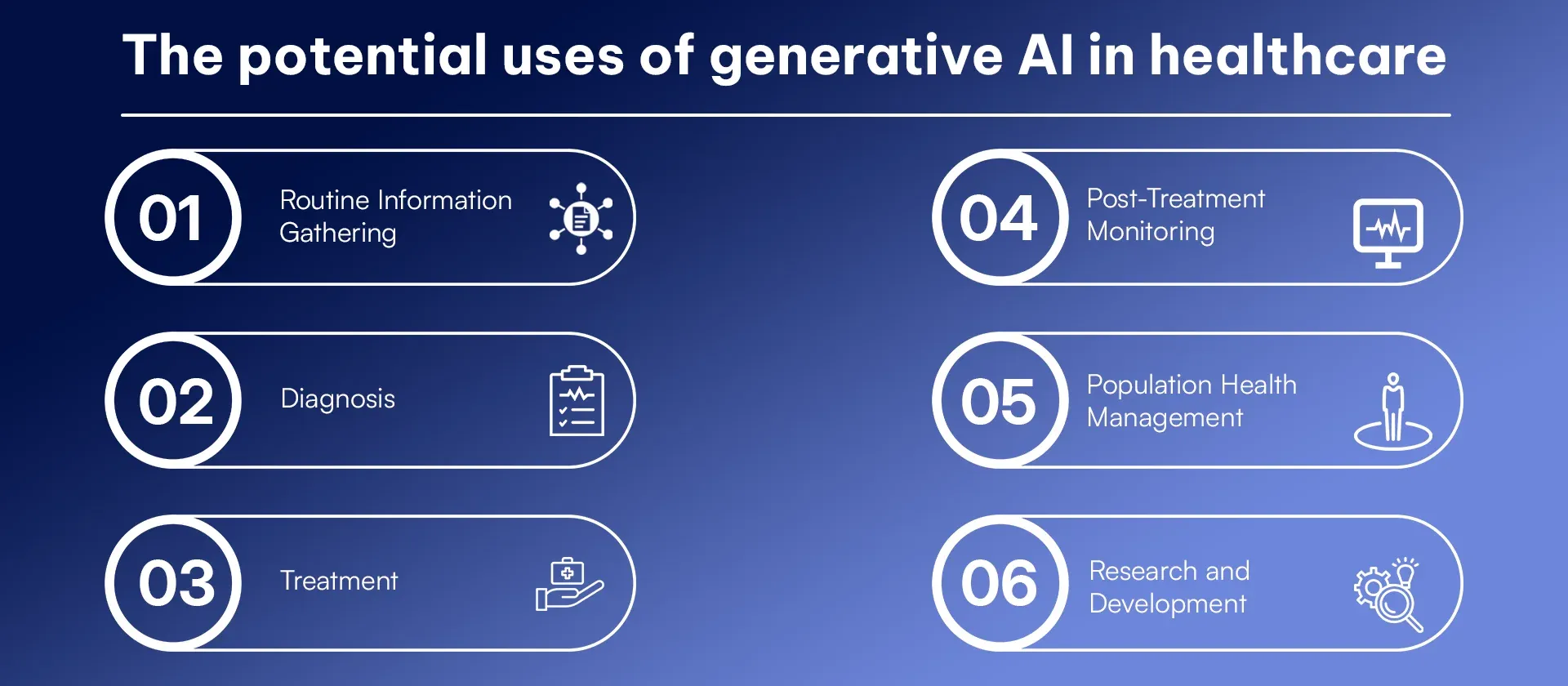
Routine Information Gathering
- Enhancement: Efficiency, patient interaction
- Functions: Data collection, query resolution, information summarisation
- Technology: AI-driven patient interfaces, health information exchanges
Diagnosis
-
Enhancement: Accuracy, speed
-
Functions: Medical imaging analysis, disease marker identification
-
Technology: AI diagnostic tools, data pattern recognition
Treatment
-
Enhancement: Personalisation, optimisation
-
Functions: Treatment adaptation, regimen management
-
Technology: AI treatment algorithms, decision support systems
Post-Treatment Monitoring
-
Enhancement: Patient adherence, outcome tracking
-
Functions: Health status monitoring, alerting deviations
-
Technology: Wearable technology, real-time AI monitoring
Population Health Management
-
Enhancement: Health outcome improvement, resource allocation
-
Functions: At-risk group identification, health trend prediction
-
Technology: AI analytics, predictive modelling
Research and Development
-
Enhancement: Innovation speed, efficiency
-
Functions: Drug interaction simulation, novel molecule generation
-
Technology: AI simulation platforms, drug development AI models
Applications of Generative AI in the Healthcare Industry
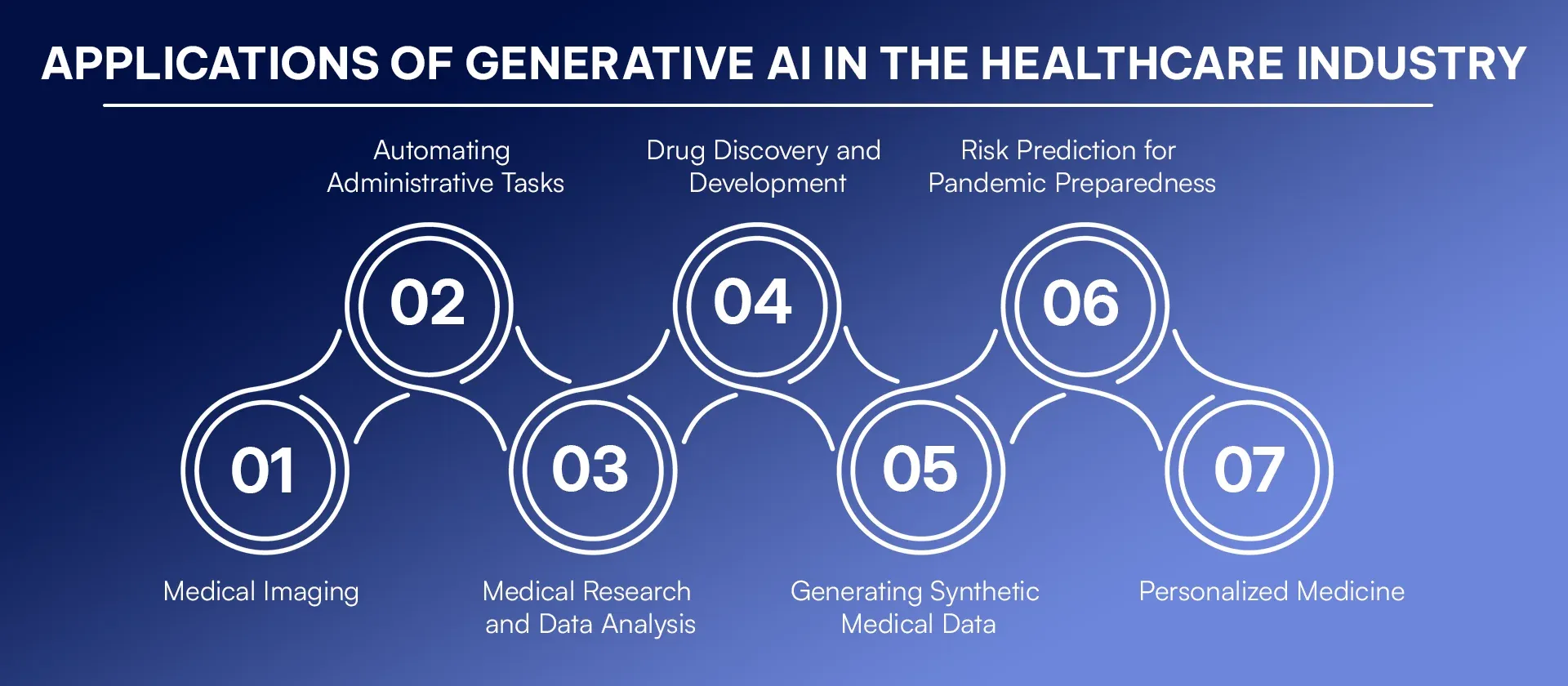
1. Medical Imaging
Generative AI models enhance diagnostic precision by analyzing medical images like X-rays, MRIs, and CT scans. They can generate high-resolution images, detect anomalies, and segment images for better understanding. AI assists radiologists by highlighting areas of concern, thus improving accuracy and reducing diagnostic time.
2. Automating Administrative Tasks
Generative AI streamlines administrative processes, such as scheduling appointments, managing patient records, and billing. AI-driven chatbots and virtual assistants can handle repetitive tasks, freeing up healthcare professionals to focus on patient care.
3. Medical Research and Data Analysis
Generative AI accelerates research by analyzing vast datasets to identify patterns, trends, and correlations. It aids in hypothesis generation, extracting insights from complex data, and creating predictive models for diseases.
4. Drug Discovery and Development
Generative models design new molecules, predict their properties, and simulate chemical reactions. This significantly reduces the time and cost of discovering new drugs, helping pharmaceutical companies bring treatments to market faster.
5. Generating Synthetic Medical Data
Synthetic data generated by AI can mimic real patient data while maintaining privacy. This data can be used for research, algorithm training, and model validation without compromising patient confidentiality.
6. Risk Prediction for Pandemic Preparedness
Generative AI models can simulate outbreak scenarios, predict the spread of diseases, and optimize resource allocation. This helps governments and organizations prepare for and respond to pandemics effectively.
7. Personalized Medicine
AI tailors treatments to individual patients by analyzing genetic, environmental, and lifestyle factors. Generative models create personalized drug formulations or predict how a patient might respond to a specific treatment.
Generative AI Use Cases in the Healthcare Industry
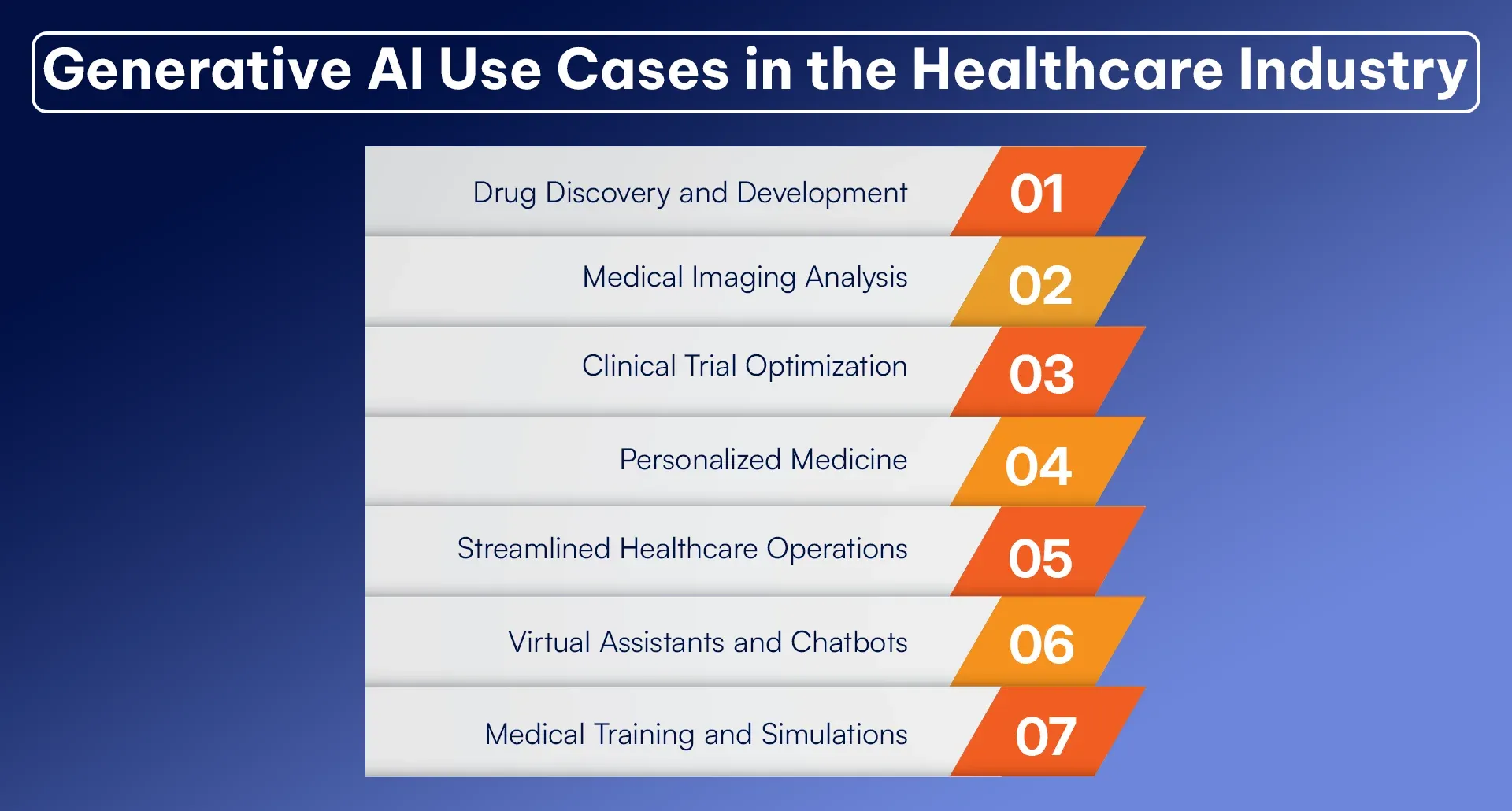
1. Drug Discovery and Development
AI-powered generative tools identify potential drug candidates, simulate their interactions, and optimize their chemical structures. This enables faster iterations and innovation in treatment development.
2. Medical Imaging Analysis
Generative AI enhances the clarity and detail of medical images, facilitating more accurate diagnoses. It also aids in reconstructing incomplete images and improving their interpretability.
3. Clinical Trial Optimization
Generative models simulate patient cohorts, predict trial outcomes, and help design more efficient trials. This reduces costs, time, and risks associated with traditional trial processes.
4. Personalized Medicine
Generative AI creates tailored solutions, such as personalized cancer treatment plans or unique drug formulations, based on patient-specific data.
5. Streamlined Healthcare Operations
AI-driven tools optimize workflow, reduce errors in documentation, and automate routine tasks like patient follow-ups and reminders, improving efficiency across healthcare facilities.
6. Virtual Assistants and Chatbots
Generative AI powers chatbots that provide 24/7 assistance, answer patient queries and triage symptoms. These tools enhance patient engagement and improve accessibility.
7. Medical Training and Simulations
AI generates realistic scenarios for training medical professionals. Simulations include virtual surgeries, emergency response drills, and patient interaction scenarios, enhancing skills without real-world
Challenges of implementing generative AI in healthcare
While the enthusiasm generative AI is met with is quite fostering, we must carefully address risks such as data privacy to maximise its benefits. Most medical records carry sensitive information, necessitating compliance for risk mitigation.
At the same time, issues such as compatibility with existing systems and the accuracy of AI outputs need to be worked on. For example, a fault in diagnosis due to generative AI could be lethal. With the accuracy of the present generative AI models, human oversight is mandatory.
Thus, we need a comprehensive approach that involves planning, stakeholder engagement, and continuous evaluation if we want to implement generative AI at scale in healthcare settings, addressing the challenges, such as AI Model Bias.
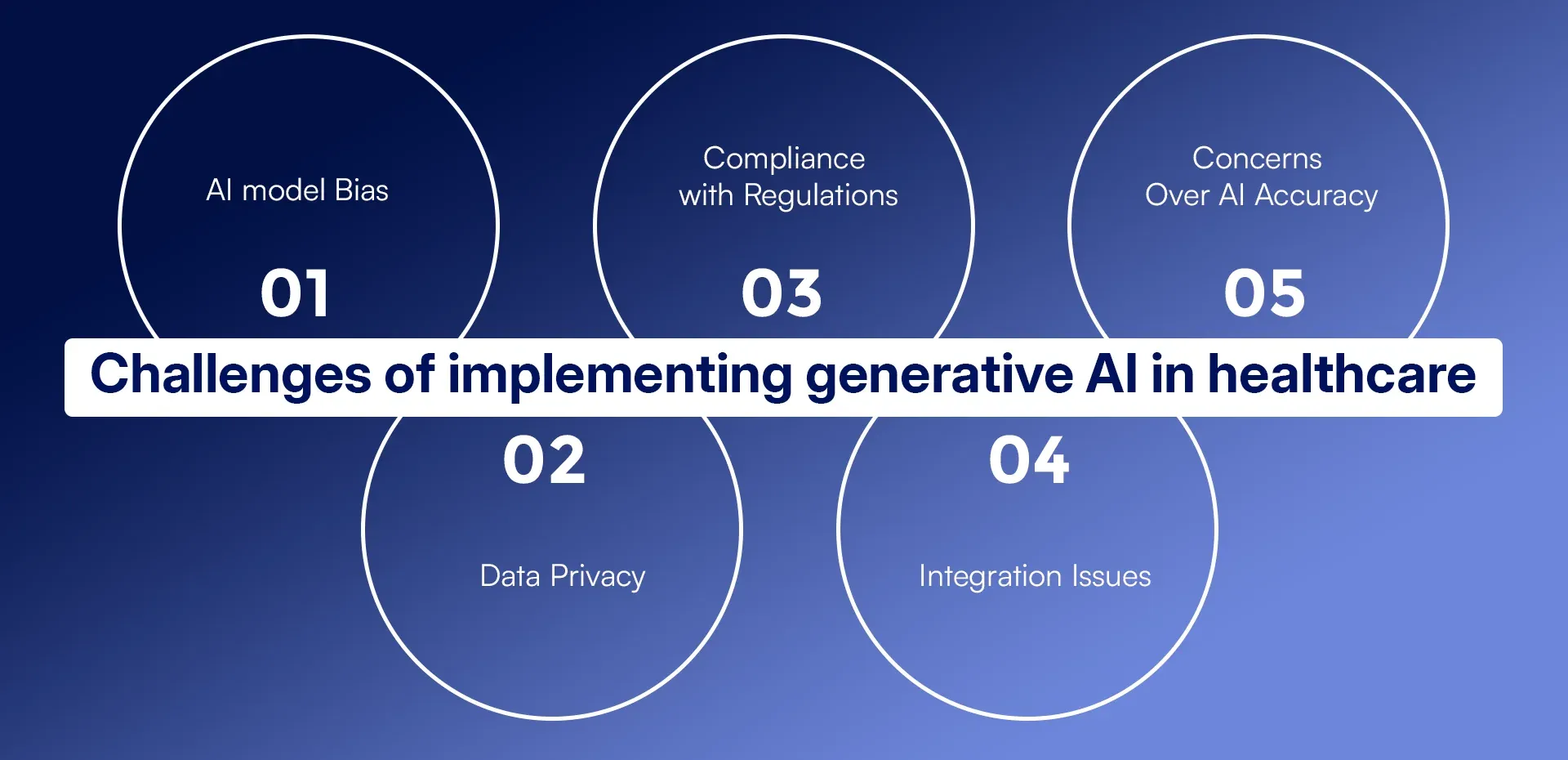
1. AI model Bias
Generative AI elies on a diverse set of data in order to predict accurately. Due to most of the erxisting datasets being homogenous, it might not be able to predict accurately about subjects from minority groups. In order to fix this, we need strict testing protocols in place for inclusion and the use of diverse data sources.
2. Data Privacy
Generative AI relies heavily on sensitive patient data in order to learn and be oble to make predictions. Since it is dealing with real data from the records, it needs to follow data protection laws and through proper and regulated encryption and access control. This can be a problem in the absence of transparent data-sharing policies.
3. Compliance with Regulations
While implementing generative AI in healthcare, the users must make sure that all healthcare regulations and compliances are duly met. Additionally, they must also take every measure to adhere to industry guidelines and secure all regulatory approvals from the designated sources.
4. Integration Issues
When hospitals are considering implementing generative AI, they must make sure that their existing systems are compatible with the kind of resource they intend to use. Legacy systems might not be able to support technologies, which might lead to the disruption of the workflow. There is also the matter of staff training, which needs to be systematically planned and executed.
5. Concerns Over AI Accuracy
While generative AI is an exiting new technology, it might have certain issues where the reliability is concerned. AI is prone to generating incorrect outputs and, at this stage, should not be implemented and used without supervision in critical areas where you need precision and accuracy such as in diagnostic applications.
Conclusion
The true potential of artificial intelligence in healthcare is finally being materialised. However, in order to meet the promise of efficiency and improved patient outcomes, driving AI adoption in healthcare, we must give consideration to the ethical, technical, and practical challenges.
This can only be possible through rigorous data privacy standards, ongoing improvements in system compatibility, and accurate AI outputs. Through innovative AI use, stringent oversight, and continuous evaluation, it is possible to enhance healthcare while upholding medical principles.
Wish to know how you can implement generative AI in your healthcare clinic? Reach out to Rejoice Hub and talk to one of our AI experts.
Frequently Asked Questions
1. What is generative AI in healthcare?
Generative AI in healthcare refers to the use of sophisticated AI models for data analysis, diagnosis, and personalization of treatment. This can be applied to streamline processes and operational functions. Technologies like machine learning help enhance efficiency and innovation in medical practices.
2. How does generative AI enhance healthcare research?
Generative AI accelerates research by mimicking drug interactions, creating new molecules, and offering personalized treatment plans. This saves time and cost in the traditional method of research.
3. How does generative AI ensure data privacy in healthcare?
Generative AI makes use of encryption, access control, and data protection protocols so that sensitive information about patients remains safe. The organizations are to follow the laws of data protection and be transparent about their policies.
4. Will generative AI replace healthcare professionals?
No, the generative AI is mostly assistive. Under the supervision of medical professionals, it takes care of repetitive or highly specialized tasks. It complements, not replaces, healthcare workers.